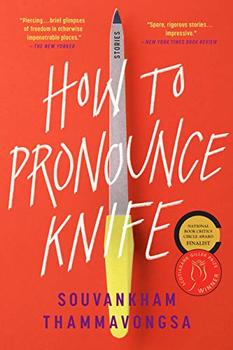Book Club Discussion Questions
In a book club? Subscribe to our Book Club Newsletter!
For supplemental discussion material see our Beyond the Book article, The Origins of Trick-or-Treating and our BookBrowse Review of How to Pronounce Knife.
Please be aware that this discussion guide will contain spoilers!
- The opening story is about a child who doesn't know how to pronounce a word. Are there words you've had trouble with or that you find unusual?
- In the story "Paris," no one ever goes to Paris and it does not take place in Paris. Why do you think the author decided to title this story "Paris"?
- Many of the stories have main characters who are not named and others who are but then their names end up changing. What is the value of a name? How do you feel about a character that is not named?
- In "Mani Pedi," Raymond's sister tells him to "keep your dreams small." Have you ever told yourself this or have you ever felt someone was saying that to you? What were those dreams that you felt you had to "keep small"?
- Work is an important theme in this collection. Have you worked a job you were terrific at, but no one noticed, or did you have a job you loved but others didn't see the value of the work?
- The stories often refer to the setting as simply "here." Why do you think the author did this with the setting of a story?
- In "Randy Travis" the mother becomes obsessed with the singer and with his music. Who was your celebrity crush, what purpose did they serve for you, and how did you grow out of it?
- In "A Far Distant Thing" the narrator said that even friendship that doesn't last is worth having. Do you agree?
- In "Picking Worms" the teenage girl in the story does not open the door for her date. Why does she do this?
- Sound is important to many of these stories. The silent letter at the front in the word knife, the voice of a mother in a dream, the way sound lasts only for a short while and disappears, or how sounds can often stand in for meaning. Why is sound a concern in these stories?
- In the Audiobook, "Edge of the World" is narrated by a male voice. Does this change the meaning of the story for you, and how?
- Mr. Vong says there's a difference between love and what feels like love. In your life experience, do you feel there is a difference? If there is a difference, what is that difference?
- Many of these stories are told from the point of a view of a child or what we learn in the end is an adult recalling a story. What are the advantages and disadvantages of doing this?
- These stories feel real, yet we are told they are fiction. Does it matter to you to know what the real story is behind them or if they come or do not come from the author's real life? Do you think such knowing could take away the magic of not knowing?
- In "The Gas Station," Mary believes there are two kinds of people. Those who are seen and those who are not. Do you agree with this? Which one do you feel you are—someone who is seen or someone who is not? Is being seen something important to you?
- There are many meanings of laughter. List and discuss the descriptions of laughter in this story collection. Why do you think the author took such care with this?
- Love is an important feeling and theme. Love of family, romantic love, love when it's failed, and love of self. Discuss the ways in which the characters love or lose their love. Which love story in the collection were you most moved by?
Unless otherwise stated, this discussion guide is reprinted with the permission of Back Bay Books.
Any page references refer to a USA edition of the book, usually the trade paperback version, and may vary in other editions.
